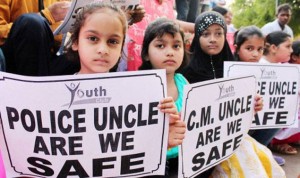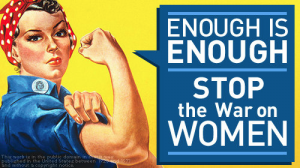Acts of Violence Against Women: From India to the Congo to the USA
Jun 11th, 2014 | By admin | Category: Featured, Reproductive Rights/Women's RightsBy Suzanne York, www.howmany.org
It’s been a horrific year for women’s rights across the globe. Just in the past couple of months there has been the kidnapping of nearly 300 girls in Nigeria, an “honor” killing of a pregnant woman in Pakistan, the rape and hanging of two teenage girls in India, and a misogynistic shooter who went on a killing spree at the University of California, Santa Barbara.
At a global summit on sexual violence in conflict taking place now in London, a doctor from the Congo – where more than half a million women have been raped in the past decade – said “the use of rape in war is as destructive as the use of chemical weapons.”
Everyday OccurrenceBut those are just the headline-making stories. Acts of violence against women occur every minute of every day all over the world, in developing countries and developed nations. Here in the U.S. a woman is raped every 6 minutes. In fact, more women are raped in the U.S. than any other country. So while the Indian attacks make the news and result, rightly so, in global outcry, the sad reality is that rape happens everywhere.
According to the respected U.S. organization RAINN (Rape, Abuse & Incest National Network):
- In 2012, 346,830 women were raped.
- 1 out of every 6 American women has been the victim of an attempted or completed rape in her lifetime (14.8% completed rape; 2.8% attempted rape).
- 17.7 million American women have been victims of attempted or completed rape.
- 9 of every 10 rape victims were female in 2003.
Sexual violence is pervasive, and cuts across all boundaries of income, class and culture. And most acts of sexual violence don’t get reported, for reasons stemming from fear of cultural backlash to fear of police officials.
Some male politicians– incredibly – make light of the violence.
Babulal Gaur, a minister in the Indian state of Madhya Pradesh, commenting on the gang-rape and killing of the girls, in neighboring Uttar Pradesh, said of rape, “sometimes it’s right, sometimes it’s wrong.” Another said, “Boys will be boys.”
But Indian politicians don’t corner the market on controversial remarks. Compare that to former U.S. Representative Todd Akin, republican from Missouri, who in 2012 said victims of “legitimate rape” rarely got pregnant, because “if it’s a legitimate rape, the female body has ways to try to shut that whole thing down.”
There is a global culture of demeaning women and trivializing women’s rights. Some attacks against women’s rights are more accepted by certain members of society, such as limiting women’s reproductive rights in the U.S. Closing a women’s health clinic can be detrimental to a woman’s health. Yet conservatives have been on a war path in recent years to restrict reproductive rights, a more subtle form of gender violence.
It’s Global and LocalGender-based violence is a global problem, whether in war-torn regions or “safe” areas. The media is culpable, allowing continued and rampant exploitation and objectification of women. Men need to be taught to respect women.
India’s newly-elected prime minister Narendra Modi just announced that India should respect its women. “Respecting and protecting women should be a priority of the 1.25 billion people in this country.”
Women and girls need to be empowered too, with jobs, education, healthcare and land rights, and they should have equal status. Laws and policies in all countries need to reflect this.
We as a global society must talk about gender violence, implement zero-violence policies, and educate men and women, girls and boys if there is to be any progress. No country is immune to gender-based violence, and ultimately it is detrimental to all of society.


